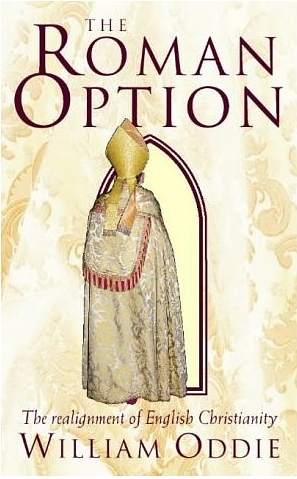 Dr. William Oddie skriver i The Catholic Herald og ga i 1997 ut en bok som heter The Roman Option, som forteller om hva som skjedde etter at hundrevis av anglikanske prester i England ble katolikker (og mange av dem deretter katolske prester) i 1992. Skulle disse måtte glemme alt de hadde gjort tidligere i livet og fra første stund bli helt vanlige engelske katolikker (også sosialt og liturgisk), eller skulle man i større grad ønske velkommen deler av den anglo-katolske tradisjonen (ting som ikke bryter med katolsk lære)? Jeg leste boka da den var ganske fersk, og den gjorde ganske sterkt intrykk på meg siden jeg opplevde lignende ting selv i Norge fra 1994.
Dr. William Oddie skriver i The Catholic Herald og ga i 1997 ut en bok som heter The Roman Option, som forteller om hva som skjedde etter at hundrevis av anglikanske prester i England ble katolikker (og mange av dem deretter katolske prester) i 1992. Skulle disse måtte glemme alt de hadde gjort tidligere i livet og fra første stund bli helt vanlige engelske katolikker (også sosialt og liturgisk), eller skulle man i større grad ønske velkommen deler av den anglo-katolske tradisjonen (ting som ikke bryter med katolsk lære)? Jeg leste boka da den var ganske fersk, og den gjorde ganske sterkt intrykk på meg siden jeg opplevde lignende ting selv i Norge fra 1994.
Vatikanet, representert først og fremst ved kardinal Ratzinger vil gjerne være generøse, og ville la disse personene ta med seg fruktbare ting fra sin egen tradisjon. I England virket det som bare kardinal Hume støttet en slik holdning, men han måtte gi seg da nesten alle andre biskoper og katolske prester i England ikke var enige. Og det er med denne historiske kunnskapen i bakhodet at Dr. Oddie skriver om det som nå holder på å skje i England for andre gang – med veldig mange nye konvertitter.
På Amazon kan man lese mer om denne boka, og bl.a. se denne anmeldelsen:
… … The book actually has quite a different object: to discuss the circumstances in which bodies of Anglo-Catholics might move collectively to Rome rather than having to convert one by one. In Oddie’s view there were serious possibilities of such collective conversions following 1992 but the opportunity was lost, mainly through the timidity of English Roman Catholics. The great appeal of this book is the nuanced way in which Oddie sketches the many and various versions of, and perspectives on, the so-called «Roman Option»; he keeps all the balls in play with considerable skill, using them to form a narrative that gradually builds (as the Roman Option appears more and more likely) before reaching an impasse that the reader knows from the start will eventually block further progress. To maintain our interest in a somewhat arcane subject matter when the denouement is thus predetermined would be impossible were Oddie’s writing not commendably precise and energetic at the same time.
It helps, of course, that his real story moves quickly away from the specific issue of women’s ordination to embrace such central issues as authority within the church and such questions as the meaning of Catholicism itself. That Oddie is so helpful on these huge topics, whilst keeping their coverage within bounds as a framework for his main narrative, is another tribute to his skills.
I have described the story of this book as being that of the Roman Option following the decision of 1992, but Oddie is at pains to place this story within the context of a broader «realignment of English-speaking Christianity»: one in which those of Catholic mind enter into full communion with Rome, but also one in which mainstream English non-conformism reunites with a Church of England that, in Oddie’s view, is now irreconcilably Protestant (if, for the moment, reluctant to see itself in such terms).
